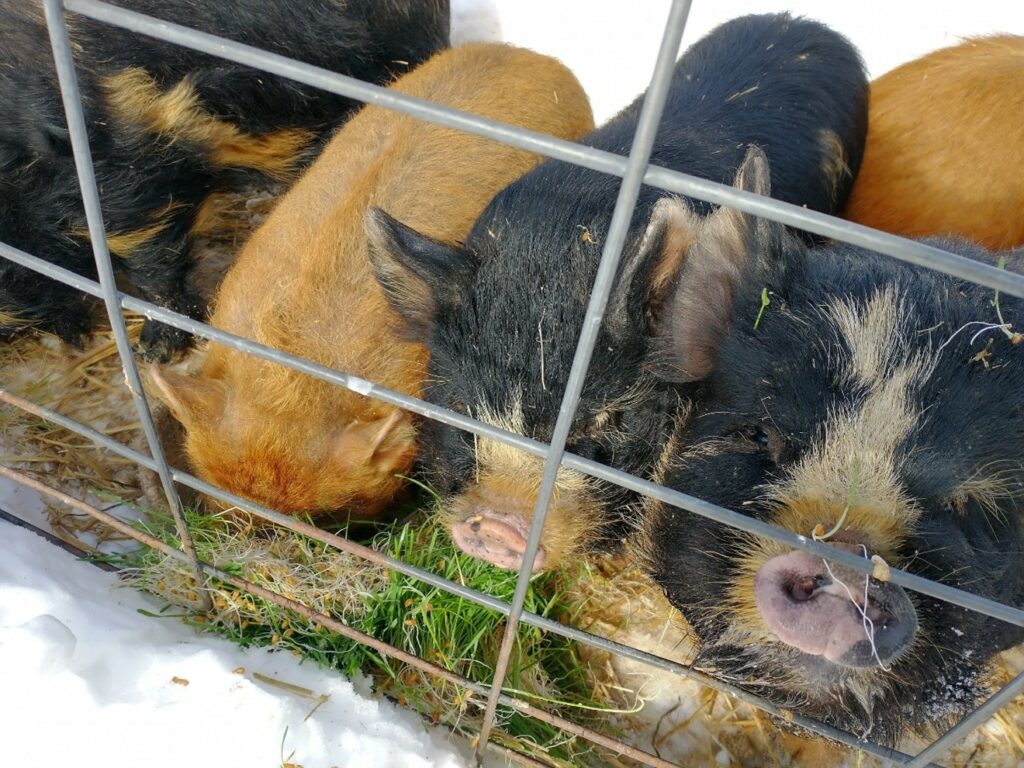The Ongoing Importance of Biosecurity

Stewardship of the earth and its animals comes with tremendous responsibility and the discipline of tending every day. While the wild animals fend for themselves in forest and field, our domestic animals need us as providers of food, shelter, and safety.
Sometimes the risks against safety are large, such as storms or predators, but sometimes the threat is tiny yet just as dangerous: germs.
In years past, we used to host weekly farm tours, taking folks on walks around the barnyard while explaining our integrated, biodiverse practices, but as the pandemic arrived in early 2020, we had to re-evaluate that method. The responsibility to the health and safety of the animals came first.
The popularity of agritourism has shifted public perspective about what farms are for—from places where people live and work to places for entertainment and bringing the kids. Some farms are fully embracing this perception, focusing on offering experiences to the public over the production of food, forage, and fiber. Being a “farm on display,” however, comes with risks to the farm and the animals as well. It baffled us how little livestock common sense or respect of animal personal space some folks have—including finding people climbing into pens to chase our ducks or wanting to ride our guard donkey.
People can also unknowingly bring in diseases with them. As COVID-19 has been proven to be transmissible to pigs and bird flu spreads across the country, the need to continue to prioritize protecting the health of our livestock continues. This also means prioritizing education efforts to help folks understand why this is important. There is no vaccine available for the pigs, no ICUs to help them recover. Contracting certain livestock diseases on a farm means the whole flock or group must be “depopulated” to prevent spread to other farms or potentially humans. It is not a risk to take lightly.
Helping folks learn about farming practices, however, need not stop with the continued sabbatical of farm tours here. In our internet-rich lives, photos, videos, and storytelling such as through these weekly articles helps offer that experience, allowing the viewer to be there in their mind’s eye instead of needing to physically stand in the barnyard.
How can you help small farms through this difficult time of trying to keep their livestock safe? Be respectful of any access restrictions the farm has enacted to protect their animals. This may be a rapidly changing situation, as threats and livestock pandemics shift and change and as we learn what is or isn’t effective for preventing the spread of disease. Be proactive in your support of small farms and their products and services. Increased biosecurity precautions can be quite costly or dramatically increase the amount of labor involved for once simple tasks such as receiving a delivery of feed or acquiring new breeding stock.
Factory farms are the largest source of and hardest hit by livestock diseases, but their choices and practices still effect smaller producers as well. Crowding the animals in damp, sunless housing, these diseases spread rapidly and easily overwhelm livestock populations. Pasture-based methods, by contrast, keep the animals outdoors with sunlight, fresh air, and exercise. Drastically fewer animals are kept in one place, which also aids reducing the likelihood of contagion and spread. Choosing local foods from small farms that embrace pasturing methods not only sends a clear signal about the type of agriculture you wish to see thrive, it directly shapes the viability of regenerative practices into the future.
Knowing your farmer adds accountability to how foods are raised. We are all connected, and our ongoing COVID-19 pandemic has illustrated just how much we are connected to each other and how our choices affect those around us. The same is equally true about the choices we make when raising and producing foods. What we choose to eat is so much more than a commodity in the grocery store. It is a chance to build relationship and work together towards a vision of a healthy planet and all its inhabitants.
We understand that you miss seeing the animals and walking the grounds, but we can all learn to be adaptive and find creative ways to share the homesteading experience with each other. Let’s work together to keep our animals happy and healthy! See you down on the farm (in a safe manner) sometime.





